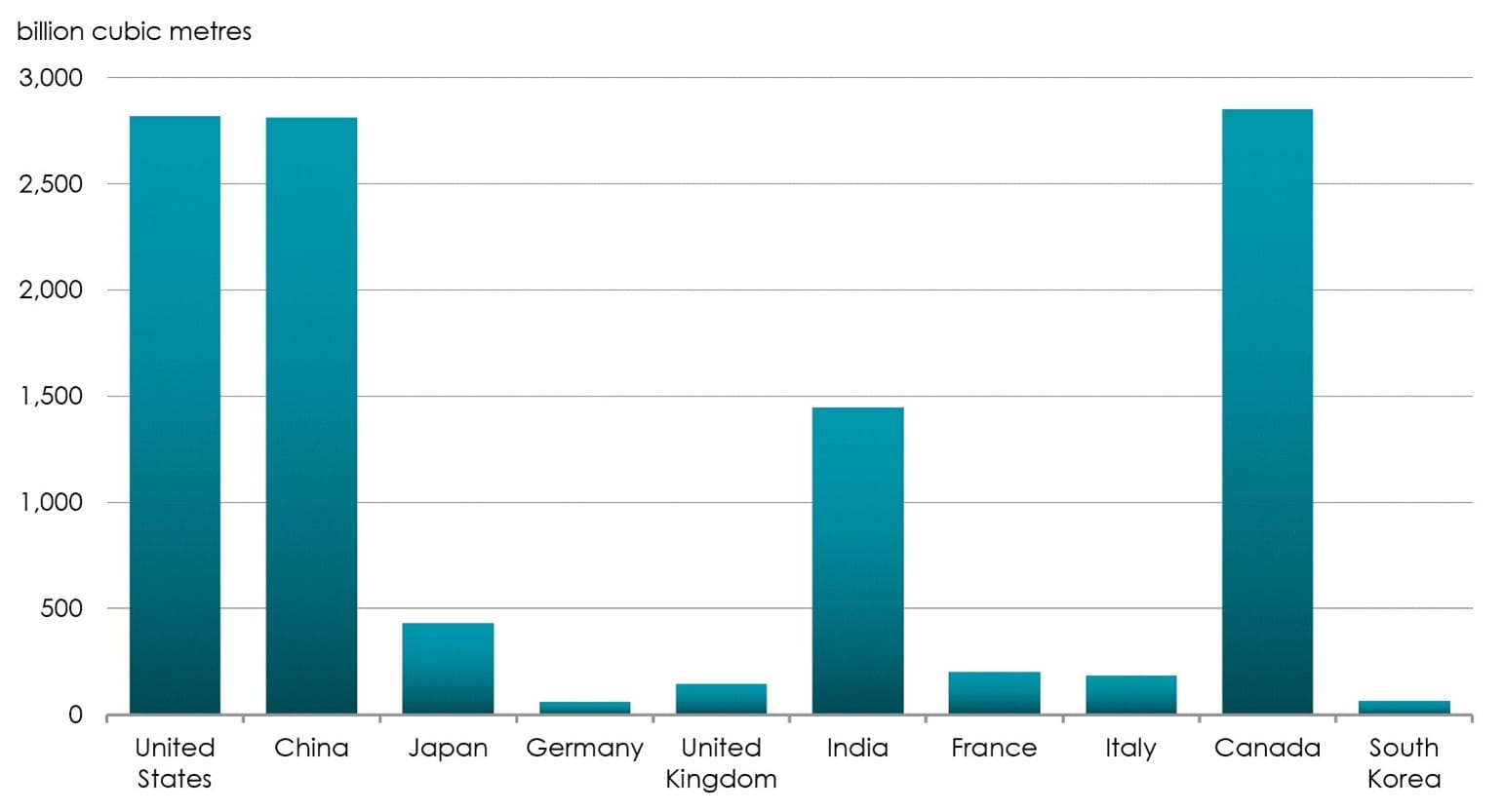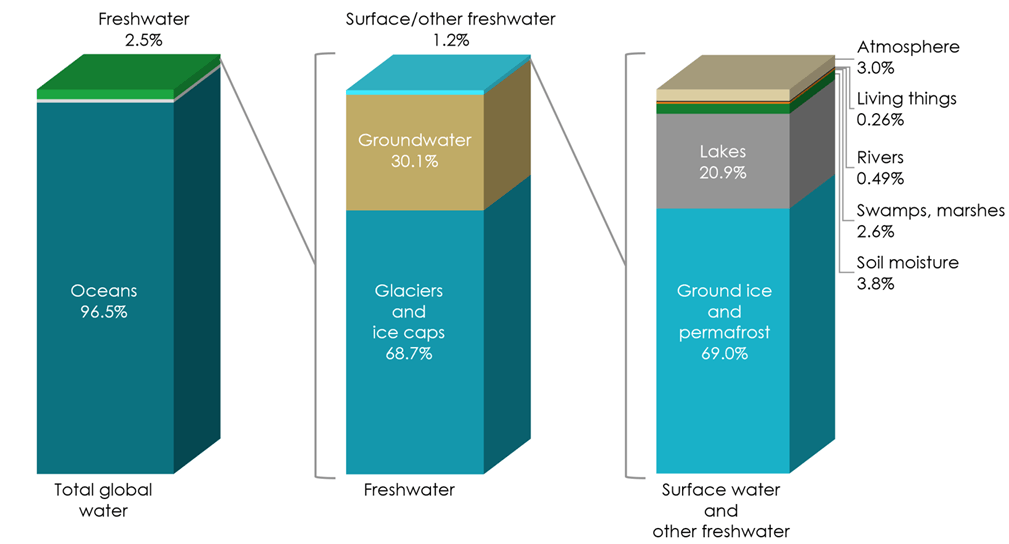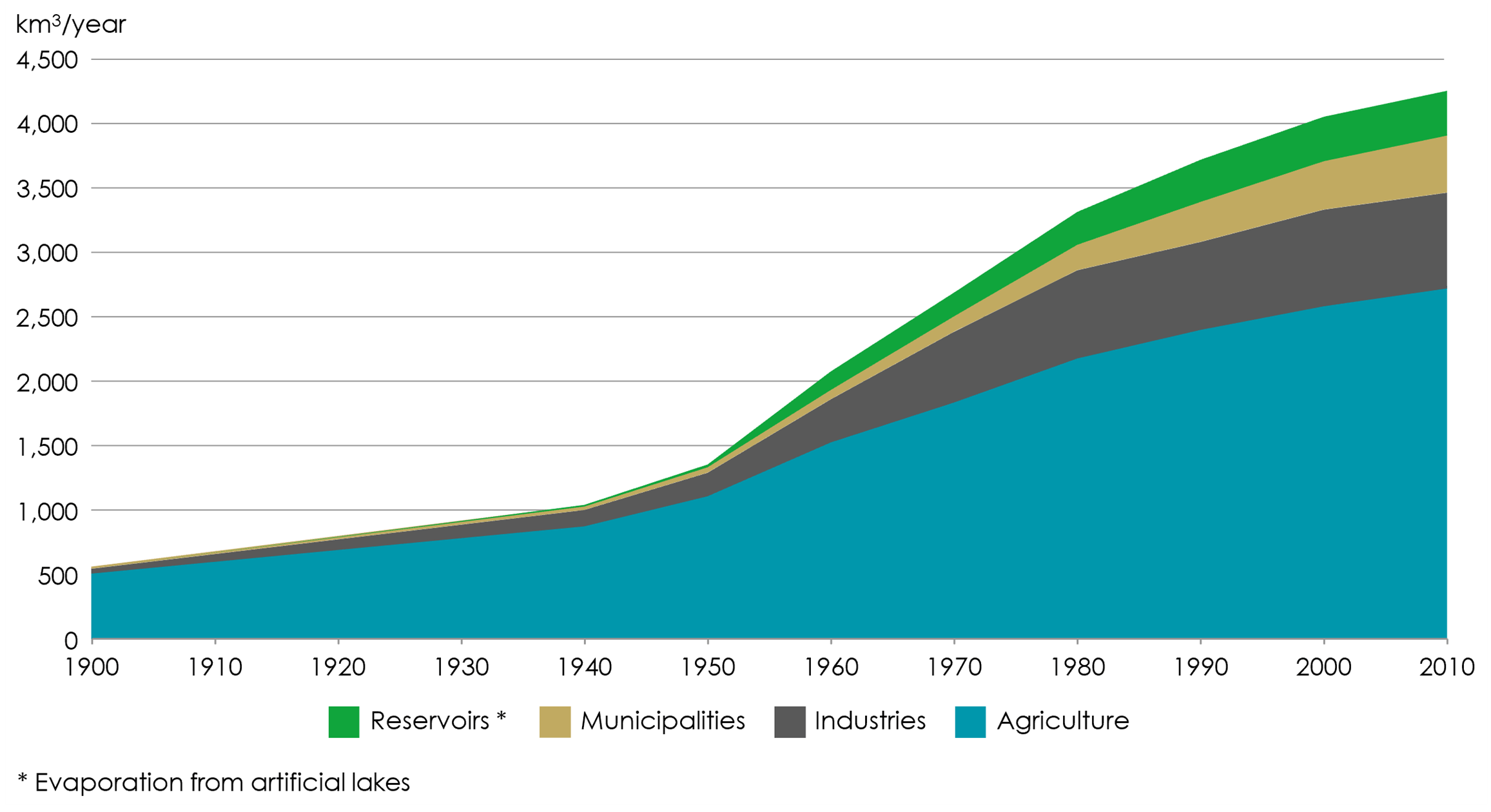Today marks World Water Day. In this article fund manager Simon Clements of the Sustainable Future Investment team discusses just how vital it is for life and why improving the management of water is a key investment theme for the team.
A building block of life
Water is essential for life, and a pillar in the modern economy as a key input to many industries aside from agriculture. It is also unique – unlike energy, it cannot easily be transported from an area of abundance to that of scarcity. Furthermore, it is viewed as a human right, and therefore pricing is heavily regulated, causing it to be under-priced and thus overused.
As well as being a unique commodity, water also has a core input into the way our economy functions. We consume over four trillion cubic metres of water annually across the globe, but access is very unevenly distributed – around two billion people globally do not have access to safe drinking water, with a further 1.6 billion lacking waters for sanitation
Fig 1: Renewable internal freshwater resources, per capita of top 10 largest economies (2020)

Source: World Bank, Morgan Stanley Research, March 2024
Of all the water in the world, less than 3% is freshwater, and more than half of this is locked in glaciers or icecaps (which will melt into the ocean unless we decide cutting pieces off and towing them to shore is a viable idea).
Fig 2: The distribution of water on, in and above the Earth – Where is Earth’s water?

Source: U.S. Geological Survey, Water Science School. “World fresh water resources” in Peter H. Gleick (editor), 1993, Water in Crisis: A Guide to the World’s Fresh Water Resources. Figures subject to rounding.
Broken down by use, we can see that 70% of freshwater withdrawals come from agriculture globally. Industry is also the fastest growing area of water demand too. Municipal water is for domestic uses like cooking, cleaning, drinking, and washing.
Fig 3: Global water withdrawal

Source: Global Information System on Water and Agriculture
Demand for water has risen sixfold over the past century, and this is only due to increase as populations and incomes continue to rise, with estimates of growth of 30% over the next 30 years. The majority of growth is coming from non-OECD (Organisation for Economic Co-operation and Development) countries, namely the BRICS (Brazil, Russia, India, China, and South Africa). This rising demand, coupled with water scarcity in economically significant regions, amounts to an estimated 40% gap between demand and renewable supply of water in 2030 according to the United Nations (UN).
Climate change has a detrimental effect on water availability primarily through changes to the water cycle. Events like droughts and floods are due to increase in intensity and frequency as rainfall becomes more variable. The Intergovernmental Panel on Climate Change estimates that 4.8 billion people will be at risk due to water stress if business as usual continues on emissions, which includes areas where half of global grain production occurs. In turn, water scarcity is a factor driving biodiversity loss, and is already beginning to have geopolitical consequences over control of water sources.
Due to being a human necessity, utilities companies are highly regulated and have not historically charged for the true cost of water. As a result, there has historically been chronic underinvestment in water services, resulting in aging infrastructure.
While agriculture looks like a huge opportunity, there are significant barriers preventing investment in water efficiency. The primary issue is that we do not pay enough for water, and hence there is less incentive to reduce the cost of its usage. Approximately 85% of utilities companies worldwide do not cover their costs, instead relying on subsidies. Because of this, prices are heavily regulated.
Ultimately, water usage needs to behave more like a market. Australia has been active in trying to create this environment, creating a regional trade in the commodity so that water can be shifted towards high value uses at times of scarcity. This enabled agricultural production to fall by only 29% during the millennium drought that saw water availability drop by 53%. Similar systems globally, with accommodations for basic human consumption, are needed to create incentives for water usage to become less intensive and more efficient.
The Sustainable Future process invests behind 20 sustainable investment themes, and one of those is Improving the management of water. We target companies that help to solve the challenges we’ve discussed, from industrial water use to municipal use and even into the agricultural sector. Companies such as Veralto, Ecolab, Agilent and Advanced Drainage systems all address these key issues, and the management of water is becoming increasingly important as an investment opportunity within our portfolios.
The key to managing water effectively is ensuring markets begin to assign some sort of fair value to the resource. This basic market mechanism is at the root of the chronic misuse of the world’s most crucial resource. As water availability becomes more scarce, governments and markets will be forced to assign a more appropriate value to water, which will incentivise businesses to better manage water usage.
We believe this process is already underway, and the companies which we invest in behind the theme of Improving the management of water are set to benefit from this shift. The change that needs to take place will involve conserving water, and our investment in Ecolab benefits from this shift. Ecolab manages one trillion gallons of water a year, and its goal by 2030 is to help its customers conserve 300 billion gallons of water.
As well as conservation, reusing and recycling fresh water is also a key part of better water management. To do this we need companies such as Veralto and Agilent, whose water testing technology ensures reused water is safe.
We remain confident that the theme of ‘Improving the management of water’ can deliver companies which deliver strong performance, while ensuring the transition to a more sustainable economy stays on course. The theme also ensures we are collectively more responsible collectively with the planet’s most important resource.
KEY RISKS
Past performance is not a guide to future performance. The value of an investment and the income generated from it can fall as well as rise and is not guaranteed. You may get back less than you originally invested.
The issue of units/shares in Liontrust Funds may be subject to an initial charge, which will have an impact on the realisable value of the investment, particularly in the short term. Investments should always be considered as long term.
The Funds managed by the Sustainable Future Team:
Are expected to conform to our social and environmental criteria. May hold overseas investments that may carry a higher currency risk. They are valued by reference to their local currency which may move up or down when compared to the currency of a Fund. May hold Bonds. Bonds are affected by changes in interest rates and their value and the income they generate can rise or fall as a result; The creditworthiness of a bond issuer may also affect that bond's value. Bonds that produce a higher level of income usually also carry greater risk as such bond issuers may have difficulty in paying their debts. The value of a bond would be significantly affected if the issuer either refused to pay or was unable to pay. May encounter liquidity constraints from time to time. The spread between the price you buy and sell shares will reflect the less liquid nature of the underlying holdings. May invest in companies listed on the Alternative Investment Market (AIM) which is primarily for emerging or smaller companies. The rules are less demanding than those of the official List of the London Stock Exchange and therefore companies listed on AIM may carry a greater risk than a company with a full listing. May invest in smaller companies and may invest a small proportion (less than 10%) of the Fund in unlisted securities. There may be liquidity constraints in these securities from time to time, i.e. in certain circumstances, the fund may not be able to sell a position for full value or at all in the short term. This may affect performance and could cause the fund to defer or suspend redemptions of its shares. May, under certain circumstances, invest in derivatives, but it is not intended that their use will materially affect volatility. Derivatives are used to protect against currencies, credit and interest rate moves or for investment purposes. There is a risk that losses could be made on derivative positions or that the counterparties could fail to complete on transactions. The use of derivatives may create leverage or gearing resulting in potentially greater volatility or fluctuations in the net asset value of the Fund. A relatively small movement in the value of a derivative's underlying investment may have a larger impact, positive or negative, on the value of a fund than if the underlying investment was held instead. The use of derivative contracts may help us to control Fund volatility in both up and down markets by hedging against the general market. The use of derivative instruments that may result in higher cash levels. Cash may be deposited with several credit counterparties (e.g. international banks) or in short-dated bonds. A credit risk arises should one or more of these counterparties be unable to return the deposited cash. Outside of normal conditions, may hold higher levels of cash which may be deposited with several credit counterparties (e.g. international banks). A credit risk arises should one or more of these counterparties be unable to return the deposited cash. May be exposed to Counterparty Risk: any derivative contract, including FX hedging, may be at risk if the counterparty fails. Do not guarantee a level of income.
The risks detailed above are reflective of the full range of Funds managed by the Sustainable Future Team and not all of the risks listed are applicable to each individual Fund. For the risks associated with an individual Fund, please refer to its Key Investor Information Document (KIID)/PRIIP KID.
DISCLAIMER
This is a marketing communication. Before making an investment, you should read the relevant Prospectus and the Key Investor Information Document (KIID), which provide full product details including investment charges and risks. These documents can be obtained, free of charge, from www.liontrust.co.uk or direct from Liontrust. Always research your own investments. If you are not a professional investor please consult a regulated financial adviser regarding the suitability of such an investment for you and your personal circumstances.
This should not be construed as advice for investment in any product or security mentioned, an offer to buy or sell units/shares of Funds mentioned, or a solicitation to purchase securities in any company or investment product. Examples of stocks are provided for general information only to demonstrate our investment philosophy. The investment being promoted is for units in a fund, not directly in the underlying assets. It contains information and analysis that is believed to be accurate at the time of publication, but is subject to change without notice. Whilst care has been taken in compiling the content of this document, no representation or warranty, express or implied, is made by Liontrust as to its accuracy or completeness, including for external sources (which may have been used) which have not been verified.














